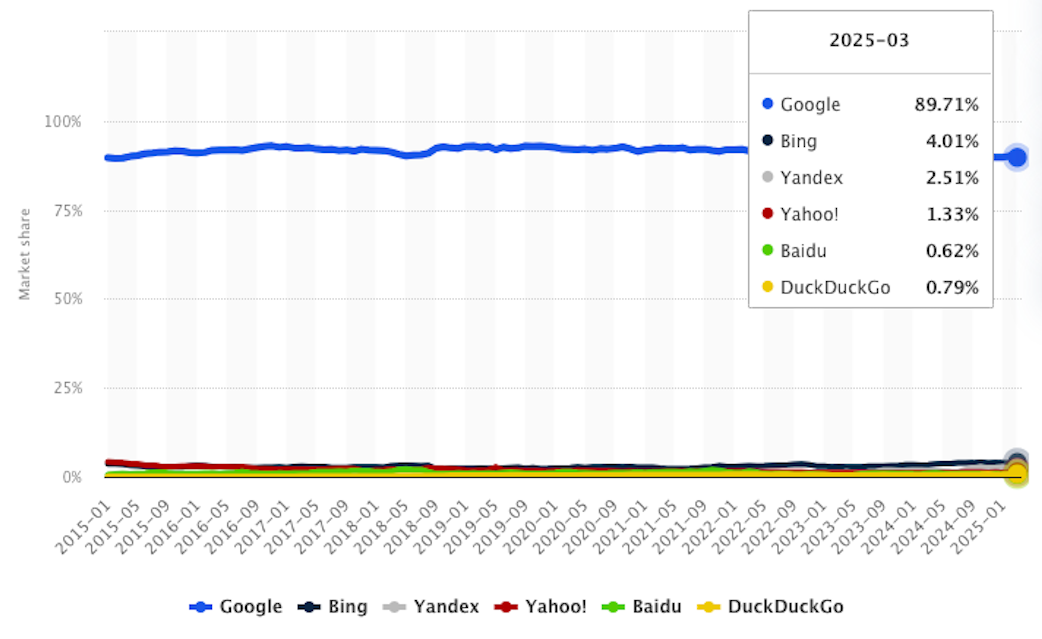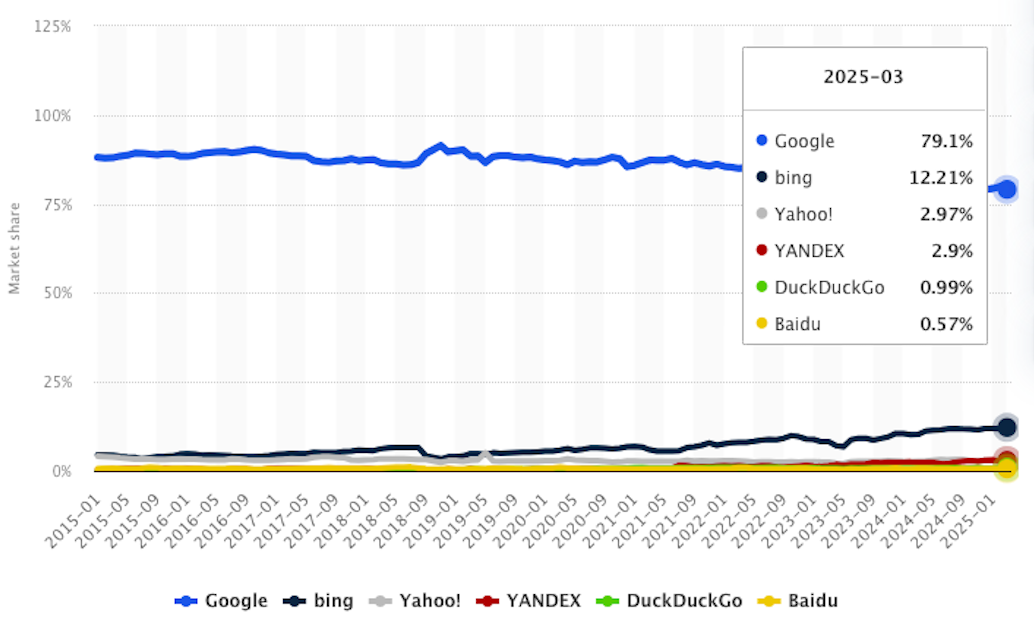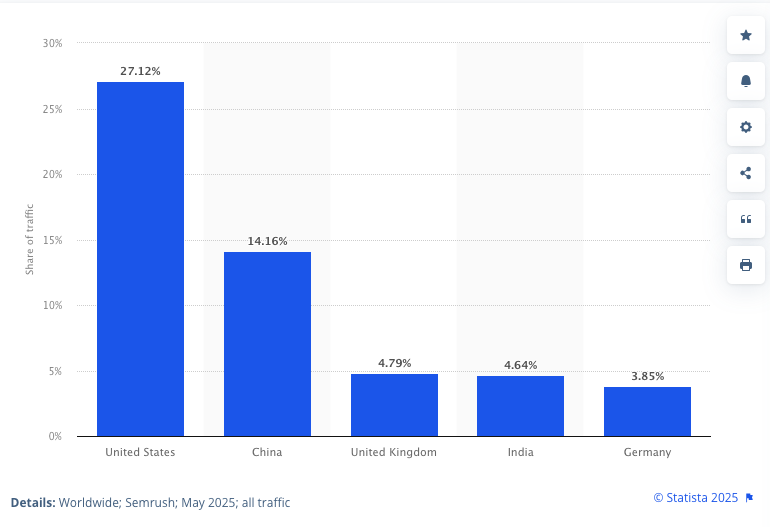Content

When most people hear “SEO,” they think of Google. That’s not a surprise as it holds almost 90% of the market!
But in the eCommerce space, big changes are already happening. According to Magecom, your visibility in ChatGPT-driven shopping experiences now heavily depends on how well your site ranks in Microsoft Bing. Why? Because ChatGPT’s Shopping Assistant relies on Bing to discover relevant content, fetch those pages with its browsing tool, and then summarize product information using its large language model (LLM).
In other words, it’s not just about how your site ranks in Google anymore. It’s also about how your product pages perform in Bing — the gateway to AI-driven product recommendations.
In this article, we’ll break down the key SEO differences between Google and Bing, and show you how to adapt your strategy to win visibility across both search engines, and in the AI assistants they now power.
While Google continues to dominate the global search market, Bing has increased its growth pace. Ignoring Bing means missing out on a segment of potential traffic, especially in markets where it holds a stronger presence.
Google continues to dominate the global search landscape, holding an impressive 89.71% of the overall market share. However, Bing still has its power, especially on desktop devices, where it accounts for 12.21% of global desktop search traffic.
While Bing’s total share may seem modest at 4.01%, its presence in desktop environments — often the default choice in corporate, enterprise, and government settings — gives it a strong foothold among key user segments. This includes professionals, decision-makers, and users with higher purchasing power who are more likely to engage with long-form content, fill out lead forms, or make B2B-related inquiries.
[[SLIDER-START]]


[[SLIDER-END]]
In short, Bing’s audience may be smaller, but it’s targeted, active, and often overlooked, making it a valuable channel for strategic SEO.
Bing has a considerable market share in certain regions. For example, 27.12% of searches in the United States happen on Bing, along with notable shares in China (14.16%), the United Kingdom (4.79%), and Germany (3.85%). It also tends to attract an older, more affluent user base — a key segment for many B2B and high-ticket B2C businesses.

When users ask ChatGPT for product suggestions, travel ideas, or service comparisons, the assistant doesn’t just pull answers from thin air. It actively searches the web, using Bing. That means your product pages (and even reviews or blog posts about your brand) need to be discoverable and well-ranked in Bing’s index to appear in AI-generated answers.
What’s more, ChatGPT’s Shopping Assistant uses Bing to crawl listings, read page content, and summarize it in natural language — giving users a fast, curated shopping experience powered by your content. If your site isn’t optimized for Bing, your competitors may become the default recommendation, even if your product is better.
To maximize your website’s visibility in search engines, it's essential to understand how Google and Bing operate — and how their algorithms differ. While both aim to deliver relevant results to users, they prioritize different factors when ranking content. Let’s view them in detail below:
Google uses a highly sophisticated and constantly evolving algorithm. It evaluates a wide range of factors, including content quality, page load speed, mobile-friendliness, and structured data richness. One of Google’s strongest advantages is its ability to understand user intent. Rather than focusing solely on keywords, Google analyzes the broader context of a query to deliver the most relevant results.
Bing is generally considered less competitive and relies on a more straightforward algorithm. This simplicity can actually benefit businesses, especially those new to SEO or operating in niche industries. Bing places more emphasis on exact keyword usage and high-quality backlinks, making it easier to predict ranking behavior and adjust content accordingly.
“It’s important to keep in mind that Bing and Google use fundamentally different search algorithms, so insights from Bing Webmaster Tools won’t always align with user behavior on Google.
For example, Bing puts greater weight on exact keyword matches in titles and metadata, whereas Google focuses more on semantic relevance and the overall context of a page. Additionally, Bing tends to factor in social signals—such as Facebook engagement—more than Google, which places stronger emphasis on backlink quality and domain authority. That’s why a well-rounded SEO strategy should account for the unique characteristics of each search engine individually.”
Anastasiia Pasteka, Middle SEO Specialist
Google relies heavily on understanding context rather than just exact keyword matches. That’s why successful content for Google doesn’t just include target keywords — it also incorporates synonyms, related phrases, and natural language structures. Google’s algorithm pays close attention to grammar, word relationships, and the overall semantic meaning of a page. Its goal is to surface the content that most accurately answers the user’s intent, even if it doesn’t contain the exact query.
Bing, however, gives more weight to exact keyword usage. It rewards clearly optimized content where primary terms and phrases are placed prominently in headings, meta tags, and body text. In this way, Bing favors precision over nuance, giving well-structured, keyword-specific pages an edge.
Tip: For Google, write naturally and include keyword variations to align with semantic search. For Bing, focus on using exact keywords in titles, meta descriptions, and H1/H2 headings to improve ranking predictability.
One of the key technical differences between Google and Bing lies in how frequently and efficiently they crawl websites.
Bing crawls pages less frequently than Google. Its bots typically focus on your site’s main pages, such as the homepage, popular content, or high-authority sections. As a result, new or lower-priority pages may take longer to be indexed or updated in Bing’s search results. This can lead to delays in visibility if your content changes often or if you frequently publish new pages.
Google, by contrast, has a much larger and more active crawling infrastructure. Its bots scan websites more comprehensively and more often, which means it can detect new pages, updates, and content changes faster. Combined with Google’s advanced contextual recognition and indexing algorithms, this makes it more responsive and efficient at keeping your site content up to date in search results.
Tip: To improve indexing speed on Bing, make sure your content is well-structured, use a clear XML sitemap, and submit important URLs via Bing Webmaster Tools. While Google is generally faster at indexing, providing a sitemap and ensuring clean internal linking can help both engines crawl your site more effectively.
When it comes to technical SEO, Google sets a high bar. It strongly emphasizes mobile-first indexing and uses Core Web Vitals as a ranking factor, evaluating page load speed, visual stability, and interactivity. These performance metrics play a crucial role in how Google ranks your pages, especially on mobile devices.
Bing, while also valuing page speed and user experience, doesn’t place as much weight on mobile-first indexing or Core Web Vitals. However, fast-loading, mobile-optimized websites still perform better on Bing, just with slightly more leniency in technical requirements.
Another key difference lies in how each engine handles canonical tags. Google is generally effective at identifying canonical URLs even if the implementation isn't perfect. Bing, on the other hand, is more sensitive to misconfigurations and may struggle to interpret canonicals correctly.
Regarding redirects, Google prefers 301 permanent redirects, and treats them accordingly. Bing, interestingly, may treat 302 temporary redirects as 301s after a few crawls, which can lead to inconsistent handling if not configured correctly.
"For Google, make sure your site is mobile-friendly, optimized for Core Web Vitals, uses properly implemented canonical tags, and relies on 301 redirects to avoid ranking issues. For Bing, also prioritize fast load times and clean redirect structures, and ensure canonical tags are explicit and correctly formatted".
Oksana Babenko, SEO Specialist
For Google, the mobile version of your website is absolutely critical. Since more than half of all searches come from mobile devices—ranging from 50% to 70% depending on the niche—Google places great emphasis on how well your site performs on smartphones. A responsive design and smooth mobile experience are key factors in achieving high rankings.
Bing also considers mobile optimization important, but to a lesser extent. While Bing evaluates site usability on mobile devices, it is not as decisive a ranking factor as it is for Google. However, site speed and stability on mobile devices can still affect Bing rankings.
Tip: Ensure your site is fully responsive and loads quickly on mobile devices for Google. For Bing, prioritize site speed and stability on mobile platforms.
Google heavily relies on the quality and quantity of backlinks. Links from authoritative, high-ranking websites are crucial for boosting your site's credibility and rankings. Google values relevance and authority, so quality backlinks from trusted sources carry much more weight than sheer volume.
Bing, on the other hand, places more emphasis on the quantity of backlinks rather than just quality. This allows sites with more links—even from less authoritative sources—to rank well. However, backlinks must still be relevant to the page’s topic to positively impact rankings on Bing.
"For Google, focus on acquiring backlinks from authoritative and relevant sites. For Bing, increasing the number of backlinks can help, but relevance remains important".
Oksana Babenko, SEO Specialist
Google places great importance on local SEO, tailoring search results based on the user's location. Local businesses benefit from properly optimized local keywords, accurate address information, business hours, and other location details. Creating and managing a Google Business Profile is essential for local search success.
Bing also values local SEO but is less sensitive to changes in local queries and data compared to Google. For Bing, social signals and backlinks play a larger role in local search rankings. Ensuring your business is listed on Bing Places for Business and maintaining active social profiles can boost local visibility.
"Keep your location information accurate and consistent for both search engines. Optimize your Google Business Profile for Google and maintain your presence on Bing Places for Business, along with active social media engagement".
Oksana Babenko, SEO Specialist
Google does not heavily factor social signals (likes, shares, tweets, etc.) into its ranking algorithm. Although social activity can indicate popularity and may indirectly help by driving traffic, Google prioritizes content quality and backlinks over social media metrics.
Bing, however, interacts more directly with social media platforms and considers user engagement on social networks as part of its ranking signals. A strong social media presence and active engagement can positively influence Bing rankings.
Tip: Actively engage with your audience on social media to boost your visibility on Bing, even though social signals play a lesser role for Google.
SEO for Google and Bing isn't just about chasing rankings — it's about understanding how each platform interprets, ranks, and delivers content, especially in an era shaped by AI-driven search experiences. While Google continues to dominate global market share, Bing has carved out a significant niche, particularly through its integration with Microsoft’s AI tools and ChatGPT-powered search features.
At Promodo, we craft SEO strategies that go beyond keywords — we align content, technical setup, and branding to meet the evolving algorithms and AI models behind both Google and Bing.
You may also like
Choose quality and trusted services to improve the presence of your company on the Internet, and feel free to contact our UK team if you have any questions.

Google is the absolute leader among search engines. That's a fact. However, ignoring SEO Bing means losing potential customers.

A regular Magento SEO audit will help to uncover why you might have problems with organic traffic and what to fix to get better results.

Ecommerce merchandising is the ultimate task each business owner has to consider to drive more sales.
.png)
If you need a convenient, insightful, and quick-to-implement BI dashboard that covers the key needs of advertising performance analysis, Essential by Promodo is
We at Promodo are ready to help you improve your performance across all digital marketing channels.
Get started
